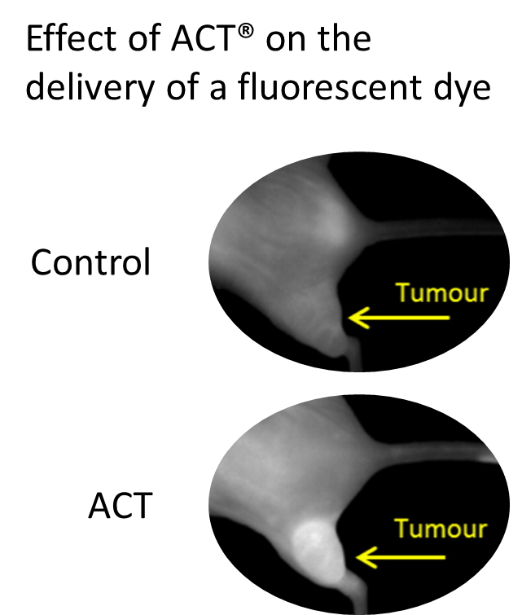Pancreatic cancer - a high unmet medical need
Pancreatic cancer poses a significant medical challenge due to its aggressive nature and limited treatment efficacy. This deadly malignancy, often diagnosed at advanced stages, shows increasing incidence, especially in the younger population, exhibits a high unmet medical need and demanding innovative therapeutic approaches
ACT for pancreatic cancer
We believe ACT can significantly improve the treatment for locally advanced pancreatic cancer.
The suboptimal delivery of an anti‑cancer agent to the target cancer cells compromises the effectiveness of established therapeutics. If the amount of drug that reached the tumour could be increased without increasing the amount administered systemically, it should be possible to increase the effectiveness of the treatment without adding to systemic toxicity.
Studies in non-clinical pancreatic cancer models demonstrated that when combined with clinically relevant chemotherapies, ACT significantly enhances anticancer effects. Read the full paper here.
We have strong support from prominent US and EU experts for developing ACT as first line treatment of locally advanced pancreatic cancer.
Preclinical highlights
In vivo non-clinical evaluation of ACT has shown a marked additive anti‑cancer effect to a range of chemotherapy agents, including irinotecan, gemcitabine, nab‑paclitaxel, the combination of nab-paclitaxel plus gemcitabine, paclitaxel, liposomal doxorubicin, and methotrexate for treatment of a range of tumours, including pancreatic cancer. [SA1] (Ng, 2022)
The effect of ACT® on the delivery of a co-injected fluorescent dye into a non-clinical xenograft model of prostate cancer was studied by at NTNU, Trondheim, Norway. ACT clearly enhanced the delivery of a co-injected vascular contrast agent locally in the tumour.
Acoustic Cluster Therapy (ACT) — pre-clinical proof of principle for local drug delivery and enhanced uptake – ScienceDirect
Effects of ACT in combination with chemotherapy demonstrated significant additive anticancer effect in a patient-derived xenograft model of pancreatic cancer.
This study tested combination of ACT with nab-paclitaxel + gemcitabine, and liposomal irinotecan, which are standard of care chemotherapies for locally advanced pancreatic cancer.
Complete response rate in the ACT + nab-paclitaxel + gemcitabine was 50%.
Han & Von Hoff, TGen, Arizona, US; Effect of acoustic cluster therapy (ACT®) combined with chemotherapy in a patient-derived xenograft mouse model of pancreatic cancer – ScienceDirect





